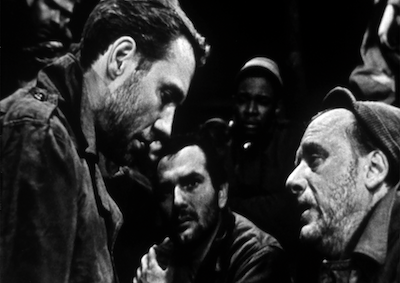Admission is free. No advance reservations. Seats are available on a first come, first served basis. Hammer Museum members will have reserved seating available at the box office. The box office opens one hour before the first program of the day.
Westinghouse Studio One: “Walk Down the Hill”
U.S., 3/18/1957
With original commercials
Beginning as a Peabody Award-winning series broadcast on CBS radio in 1947, the cathode ray tube incarnation of Studio One (1948-1958, under various alternate titles) was one of the most enduring anthology dramas of the golden age of television. In addition to adaptations of literary works, over the course of more than 450 episodes Studio One produced original, standout dramas penned by an elite group of writers leaving their mark on the new medium, including Reginald Rose (“Twelve Angry Men”), Rod Serling (“The Arena”), Gore Vidal (“Dark Possession”) and Ernest Kinoy, author of the deeply personal teleplay “Walk Down the Hill.”
Set in a Nazi prisoner-of-war camp during World War II, “Walk Down the Hill” concerns a Jewish G.I. (William Smithers) imperiled when his captors question the American P.O.W.s about their religious affiliation. Based on Kinoy’s own harrowing experience when taken prisoner by the Nazis while serving in the 106th Infantry, the tense morality drama explores universal humanist themes of faith and conscience that extend beyond the parameters of religion. Allegorically, the complex work also gently illuminates the mechanisms and consequences of the Blacklist gripping Hollywood at the time of its writing.
Produced by future Television Academy Hall of Fame inductee Herbert Brodkin (Holocaust), “Walk Down the Hill” boasts a gifted ensemble cast including John Fiedler, Don Gordon, Ivan Dixon, Clu Gulager and Frank Sutton — all of whom would soon become in-demand actors accumulating extensive credits in films and on TV. Screenwriter Kinoy later contributed hard-hitting teleplays to innovative, socially conscious TV dramas including Naked City, The Defenders and the groundbreaking mini-series Roots and Roots: The Next Generation. He received the Writers Guild Laurel Award for Lifetime Achievement in Television in 1978.—Mark Quigley
DCP, b&w, 60 min. CBS. Producer: Herbert Brodkin. Director: Norman Felton. Writer: Ernest Kinoy. With: William Smithers, David Lewis, Don Gordon, Frank Sutton.
Preservation funded by the John H. Mitchell Television Preservation Endowment. Digitally preserved by the UCLA Film & Television Archive in collaboration with Paramount Pictures Archive from 16mm kinescope picture and track negative elements and a composite kinescope. Laboratory services by FotoKem, Endpoint Audio Labs. Special thanks to Andrea Kalas, Charlotte Barker, Graham Marshall, Peter Murray, Patrick Scheg. Use courtesy of CBS Studios.
Special thanks to our community partners: UCLA Alan D. Leve Center for Jewish Studies, UCLA Department of History.






 Mobile Navigation
Mobile Navigation

